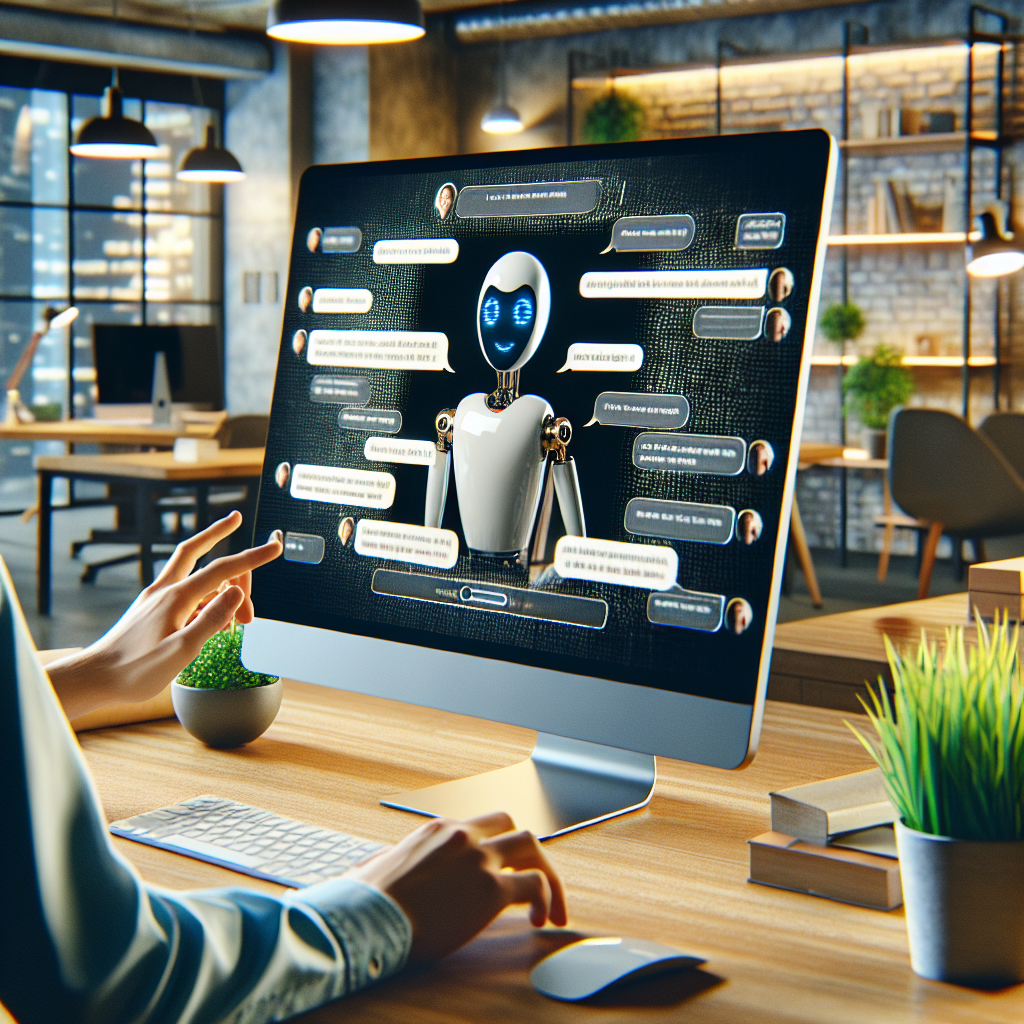Boost Your Business Solutions with AI Chatbots Today!

In today’s fast-paced digital world, businesses are constantly seeking innovative solutions to enhance their operations and stay ahead of the competition. One such groundbreaking technology is the AI chatbot. These intelligent systems are designed to simulate human-like conversations, providing automated responses to customer inquiries, streamlining processes, and improving overall efficiency.
AI chatbots can be integrated into various platforms such as websites, social media, and mobile apps, offering businesses a versatile tool to engage with their audience. By leveraging natural language processing (NLP) and machine learning algorithms, chatbots can understand and respond to customer queries in real-time, providing a seamless and personalized experience.
Whether you are a marketer, agency owner, or a business looking to explore innovative solutions, understanding the potential of AI chatbots is crucial. They not only help in reducing operational costs but also in enhancing customer satisfaction by providing instant support. Additionally, AI chatbots can gather valuable data on customer interactions, which can be used to refine marketing strategies and improve service offerings.
If you’re interested in delving deeper into the world of AI chatbots and learning how to build them, consider enrolling in our Learn AI Chatbot Course. This comprehensive course is designed to equip you with the knowledge and skills needed to create powerful AI chatbots tailored to your business needs.
Benefits of AI Chatbots for Businesses

Integrating AI chatbots into your business operations can yield numerous advantages that significantly enhance both customer experience and operational efficiency. One of the most notable benefits is 24/7 customer support. Unlike human agents who require breaks and shifts, AI chatbots are available round the clock, ensuring that customer queries are addressed promptly at any time of the day.
Another key advantage is the cost-effectiveness of AI chatbots. By automating routine tasks and customer interactions, businesses can reduce the need for a large customer service team, thereby cutting down on labor costs. This allows human agents to focus on more complex and high-value tasks, enhancing overall productivity.
AI chatbots also play a crucial role in personalizing customer interactions. By leveraging data analytics and machine learning, chatbots can offer tailored recommendations and solutions based on individual customer preferences and past behaviors. This level of personalization not only improves customer satisfaction but also fosters brand loyalty.
Moreover, AI chatbots can handle multiple queries simultaneously, ensuring scalability during peak times. This prevents delays and bottlenecks, providing a smooth and efficient experience for customers. Additionally, chatbots can gather valuable insights through interactions, helping businesses refine their strategies and make data-driven decisions.
In summary, the benefits of AI chatbots extend beyond just customer service. They enhance operational efficiency, reduce costs, and provide valuable data insights, making them an indispensable tool for modern businesses looking to thrive in a competitive market.
Implementing AI Chatbots in Customer Service

Incorporating AI chatbots into your customer service framework can revolutionize the way you interact with your customers. The first step in implementing AI chatbots is to identify the key areas where they can add the most value. Typically, these areas include handling frequently asked questions, managing appointment bookings, and providing basic troubleshooting assistance.
Once you’ve determined the tasks that can be automated, the next step is to select the right chatbot platform. There are numerous platforms available, each offering various features such as natural language processing, machine learning capabilities, and integration with existing systems. Choose a platform that aligns with your business needs and technical capabilities.
After selecting a platform, it’s crucial to design the chatbot conversation flow. This involves mapping out the different scenarios and user interactions that the chatbot will handle. A well-designed conversation flow ensures that users have a seamless and intuitive experience. It is also essential to incorporate fallback options, where the chatbot can transfer complex queries to human agents, ensuring that customer satisfaction is maintained.
Training your chatbot is another critical aspect of implementation. Utilize historical data and customer interactions to train the chatbot, making it more accurate and effective over time. Continuous learning and improvement are vital, so regularly update the chatbot with new data and refine its responses based on user feedback.
Finally, integrating the chatbot with your existing customer service tools and channels is essential for a cohesive experience. Whether it’s your CRM system, helpdesk software, or social media platforms, ensure that the chatbot can interact seamlessly with these tools to provide a unified service.
By following these steps and continually optimizing the chatbot’s performance, businesses can significantly enhance their customer service operations, leading to improved customer satisfaction and loyalty.
Streamlining Operations with AI Chatbots

AI chatbots can play a pivotal role in streamlining operations across various business functions, leading to increased efficiency and cost savings. One of the primary benefits of integrating AI chatbots into your operations is their ability to automate repetitive tasks. This includes processing orders, managing inventory levels, and scheduling appointments. By automating these tasks, businesses can reduce the burden on human employees, allowing them to focus on more strategic activities.
Another significant advantage is the ability of AI chatbots to provide real-time data and analytics. Chatbots can collect and analyze data from customer interactions, providing insights into consumer behavior, preferences, and pain points. This data can be invaluable for making informed business decisions and optimizing operational processes. Additionally, chatbots can help monitor and manage workflows, ensuring that tasks are completed efficiently and on time.
AI chatbots are also instrumental in enhancing internal communication within an organization. They can serve as virtual assistants for employees, providing instant access to information, answering queries, and facilitating communication between different departments. This can lead to improved collaboration and faster resolution of issues, contributing to a more cohesive and productive work environment.
Furthermore, AI chatbots can assist in managing customer relationships by integrating with CRM systems. They can automatically update customer records, track interactions, and provide personalized responses based on historical data. This level of automation ensures that customer interactions are consistent and tailored, enhancing the overall customer experience.
Implementing AI chatbots for operational efficiency requires careful planning and execution. It’s essential to identify the specific areas where automation can have the most impact and to ensure that the chatbot is well-integrated with existing systems. Regular monitoring and updates are also crucial to ensure that the chatbot continues to perform optimally and adapt to changing business needs.
By leveraging AI chatbots to streamline operations, businesses can achieve greater efficiency, reduce operational costs, and enhance overall productivity, positioning themselves for long-term success.
Enhancing Customer Engagement using AI

In today’s competitive marketplace, enhancing customer engagement is essential for business success. AI chatbots are increasingly becoming a key tool in achieving this goal by providing instant, personalized interactions that cater to individual customer needs. One of the most compelling features of AI chatbots is their ability to offer 24/7 customer support. This means that customers can get their questions answered and issues resolved at any time, without the need to wait for business hours. This level of availability significantly improves customer satisfaction and loyalty.
AI chatbots excel in personalizing customer interactions. By using data from previous interactions and customer profiles, chatbots can offer tailored recommendations, personalized offers, and customized support. This personalized approach makes customers feel valued and understood, which fosters a stronger connection with the brand. For example, an AI chatbot can recommend products based on a customer’s past purchases or browsing behavior, making the shopping experience more engaging and efficient.
Furthermore, AI chatbots can handle multiple interactions simultaneously, ensuring that no customer is left waiting. This capability is particularly beneficial during peak times or promotional events when the volume of customer inquiries can be overwhelming. By efficiently managing these interactions, chatbots help maintain a smooth and positive customer experience.
Another significant benefit of AI chatbots is their ability to gather and analyze customer feedback. Chatbots can conduct surveys, ask for reviews, and collect feedback in real-time. This data can then be used to make informed decisions about product improvements, service enhancements, and overall customer experience strategies. By actively seeking and utilizing customer feedback, businesses can continuously improve their offerings and better meet customer expectations.
Integrating AI chatbots into your customer engagement strategy also allows for seamless multichannel support. Whether customers are interacting via your website, social media, or mobile app, AI chatbots can provide consistent and cohesive support across all platforms. This unified approach ensures that customers have a positive and integrated experience with your brand, no matter how they choose to engage.
In conclusion, leveraging AI chatbots for customer engagement offers numerous advantages, from providing round-the-clock support to personalizing interactions and gathering valuable feedback. By implementing AI chatbots, businesses can enhance customer satisfaction, build stronger relationships, and drive long-term success.
Future Trends in AI Chatbots for Business
The landscape of AI chatbots is continuously evolving, and businesses need to stay ahead by understanding the future trends in this dynamic field. One of the most exciting developments is the integration of natural language processing (NLP) and machine learning capabilities. These advancements enable chatbots to understand and respond to human language more accurately and contextually, making interactions more natural and effective.
Another emerging trend is the use of voice-activated chatbots. With the increasing popularity of voice assistants like Amazon’s Alexa, Google’s Assistant, and Apple’s Siri, integrating voice capabilities into business chatbots is becoming essential. Voice-activated chatbots can offer hands-free convenience and are particularly useful in environments where typing is not feasible, such as while driving or cooking.
As businesses collect more data, the role of AI chatbots in data analytics is set to expand. Future chatbots will not only assist in customer interactions but also analyze data in real-time to provide actionable insights. These insights can help businesses make informed decisions, optimize marketing strategies, and enhance customer experiences.
Moreover, the trend toward multi-modal interactions is gaining traction. This involves combining text, voice, and even visual inputs to create a more interactive and engaging user experience. For example, a chatbot could use visual recognition to identify a product in a customer’s photo and provide relevant information or support.
Security and privacy will continue to be paramount as chatbots handle more sensitive customer data. Future AI chatbots will incorporate advanced encryption and authentication methods to ensure that customer information remains secure. Businesses must prioritize these aspects to build and maintain trust with their customers.
Lastly, the integration of AI chatbots with other emerging technologies like blockchain and the Internet of Things (IoT) will open new possibilities. These integrations can enhance operational efficiencies, improve supply chain management, and enable more personalized customer experiences.
As we look to the future, it is clear that AI chatbots will play an increasingly vital role in business operations and customer engagement. To stay competitive, businesses must embrace these trends and continually innovate their chatbot strategies.
Ready to take your business solutions to the next level with AI chatbots? Learn AI Chatbot Course today and start building powerful, future-ready chatbots!








